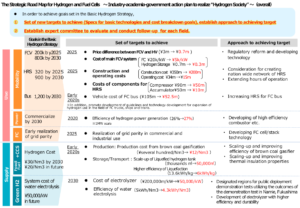METI Releases Major Revision to Hydrogen Roadmap
By Stephen H. Crolius on April 10, 2019
Japan’s Ministry of Economy, Trade and Industry (METI) announced on March 12 that it had released a “major revision” to the country’s Hydrogen and Fuel Cell Strategy Roadmap. The Roadmap was first formulated in 2014 to “secure the goals set forth in the Basic Hydrogen Strategy and the 5th Basic Energy Plan for the realization of a hydrogen society.” The Roadmap’s last revision in 2016 predates new editions of the foundation documents that were released in December 2017 and July 2018, respectively.

According to METI’s press release (and the English-language PDF), the Roadmap includes “targets for the specifications and cost breakdown of basic technology”; specifies “the necessary actions to achieve the targets”; and sets up a working group for expert evaluation.
Arguably the most important goals in the document speak to the delivered price of hydrogen imported from “resource-rich countries.” In its original formulation, the Roadmap set a 2030 goal of ¥30 per nM3 of hydrogen ($3.00 per kg) and targeted a “future price” of ¥20 per nM3 ($2.00 per kg), with the implication that the latter would be at parity with the price of “conventional energy sources”, such as LNG. In the updated version, the Roadmap notes that hydrogen would need to be priced at ¥13 per nM3 ($1.30 per kg) to match the current price of LNG on an energy-equivalent basis. (The price of LNG is noted at $10 per million BTUs.)
It can be imagined that the update will increase the cost reduction pressure on all parts of the hydrogen value chain and cause investment to flow to the hydrogen carrier with the lowest costs of transportation and storage.
It is clear that a consensus has not yet formed in favor of ammonia in this regard, since the only hydrogen carrier to receive explicit mention in the Roadmap is liquid hydrogen. (Precise targets are established for scale of LH2 storage tanks and the energy required for liquefaction.) Ammonia and liquid organic hydrides both must wait for a future update to receive such recognition.
We have previously written on this subject in July 2018 (5th Basic Energy Plan, LH2 Investment, and in January 2018 (Ammonia Positioned for Key Role in Japan’s New Hydrogen Strategy).